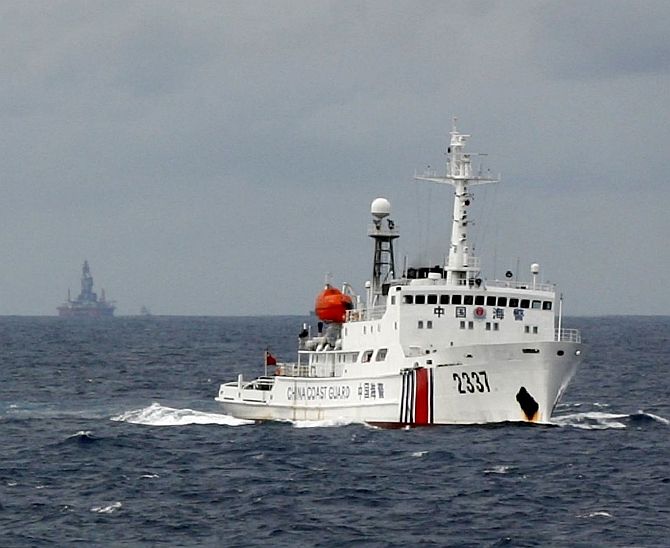If the aim is to become a player with some strategic space of its own, not just in the Indian Ocean region but also in the adjoining region, then greater interaction with China is desirable, even necessary, says Premvir Das.

One month down the line, Prime Minister Narendra Modi's visit to China is already history.
The positive outcomes have been commented upon extensively, mainly in the Indian media.
The fact that Chinese President Xi Jinping went to Xian to receive his guest, just as the latter went to Ahmedabad to meet his last year, was more than mere courtesy.
The joint statement issued as Modi departed from the country covered a very broad spectrum of engagement, some more meaningful than others, and the memoranda of understanding signed with Chinese businessmen in Shanghai totalling $22 billion in investment was the icing on this cake -- even if many of the promises do not finally materialise.
The prime minster's speech to a university in Beijing did some plain talking, asking China to address "issues that lead to hesitation and doubt, even distrust in our relationship" -- surprising many by its frankness.
On the other hand, the joint statement included just three lines on military cooperation, restricting itself to exercises and ship visits. Considering that similar pronouncements with the United States, Australia and Japan included two to three paragraphs on maritime security cooperation, this was a little insipid.
Understandably, issues like the Maritime Silk Route, on which the two countries have differences, did not figure in the statement put out for public consumption, though it is possible that some might have been talked over at the more private meetings. And, yes, the South China Sea found no mention.
Within 10 days of the prime minister's departure, China came out with its New Defence Strategy.
This speaks of "active defence", whatever that might mean, and sets out a goal of moving from "offshore waters defence" to "offshore waters defence and open seas protection". This is a qualitative enhancement in the maritime profile it seeks for itself, commensurate with its ambition of becoming one of two global players, on a par with the United States.
Immediately thereafter came the Shangri-La Conference in Singapore, held annually. This, although non-governmental, attracts official participation at the highest levels.
Articulations at this gathering were predominantly focused on maritime security and issues in the waters of the Western Pacific and principally the SCS.
US Defence Secretary Ashton Carter declared that his country would not accept redrawing of jurisdictions at sea that arose from "artificial structures and reclamation" -- clearly pointing his finger at China.
The Australian defence minister, shifting from the quite soft position on the South China Sea issues held by his country thus far, stressed the need for "everyone" to adhere to international law, thus implying that China's activities stood in violation of it.
Japan's defence minister outlined a Shangri-La Defence Initiative in which there would be confidence-building measures, maritime domain information exchange, a code of conduct and so on.
Several leaders from Southeast Asia spoke of serious concerns at the developments in the SCS and the lack of regional trust.
India's representative, the junior minister in the ministry of defence, either did not speak or was not heard.
The deputy chief of the People's Liberation Army General Staff, Admiral Sun Jianguo, maintained that China would follow its newly promulgated strategy, which was not aimed at any country but would enhance peace and tranquility -- not anything unexpected.
If we look at these three separate events from the Indian point of view, there is some dissonance.
It is almost as if we showed little interest on issues that arouse great concern amongst littorals of the Western Pacific or those that operate in these waters.
While India is an Indian Ocean Region littoral, where most of its interests and concerns lie, almost half of its overseas trade moves through the SCS, and freedom of navigation and safe movement of commerce there must be viewed as an important part of our national interest.
This is quite aside from the energy exploration joint ventures that we are participating in with Vietnam and which we might replicate with other littorals of that region in the future; at some time, this is likely to extend into the realm of seabed mining. Therefore, peace and tranquility, and adherence to international law by all concerned are issues on which we must take a position; even more so if our "Look East" policy is to transform into "Act East".
Both China and India are now becoming more reliant on the seas than ever before, and the resulting concerns will continue to grow as their economies integrate more closely with those of others -- and, inevitably, the two countries will seek to enhance their maritime profiles.
This is easier said than done. Building ships and submarines is only one aspect; for countries that are essentially land powers shifting focus seawards is not easy.
With a 15,000-km border with six neighbours, of which two have been military adversaries, India is not going to become a maritime power anytime soon; and much the same can be said of China.
As a famous British admiral once said, it takes three years to build a ship, but 300 years to build a navy. So the maritime road for both countries is a potholed one, on which movement can only be slow.
For all the U-boats that Germany built and deployed in World War II and despite all the ships and nuclear submarines that Soviet yards produced in later years, neither country could emerge as a credible power at sea, restricted access to "blue" waters being a major impediment for both.
In its quest to become a maritime power, China is also constrained by tyrannies of this same geography, with access to the seas even in the Pacific not easy, leave aside that to the Indian Ocean.
India, with its two-coast configuration and island territories that extend its "reach", is better placed, yet capabilities and mindsets that make for such power are not anywhere near.
It is in this perspective that issues connected with our interests at sea should be seen.
If the strategy is to contain China militarily while engaging it otherwise, the India-US-Japan-Australia-Vietnam conjunction might appear to be the right way to go; but if the aim is to become a player with some strategic space of its own, not just in the IOR but also in the adjoining region, then greater interaction with China is desirable, even necessary.
This requires not just social, cultural and economic interfaces, such as those just negotiated, but, equally, engagement between the two militaries, especially at sea.
At a recent bilateral Track-II meeting in Beijing, a former deputy chief of the PLA General Staff stressed the need to greatly enhance the quality of exercises and exchanges between the two navies as the present level was very ordinary.
This suggestion has merit.
Future strategic scenarios will increasingly focus on the Indo-Pacific littorals and we must prepare for them more proactively, with maritime security interests acting in concert with diplomacy and our larger national goals and objectives; neither the pre-1962 "Bhai-Bhai", nor the post-conflict "Bye-Bye", but through a steady and careful "By and By".
The writer, a former commander-in-chief of the Eastern Naval Command, has also served in the National Security Advisory Board.
Image: Chinese Coast Guard vessel passes near the Chinese oil rig Haiyang Shi You 981 in the South China Sea. Photograph: Reuters









